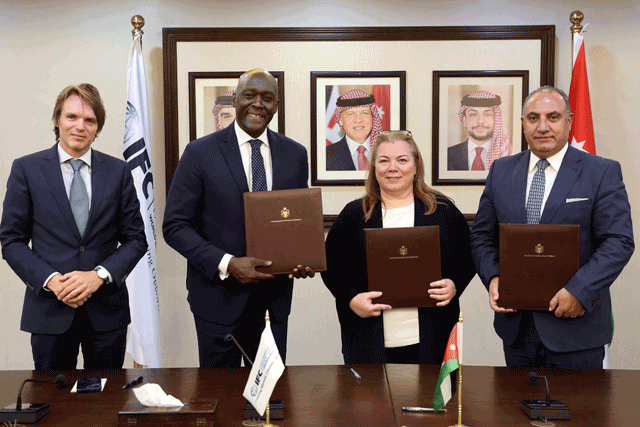You are here
IFC says it seeks to make Jordan a destination of choice for investment
By Batool Ghaith - Dec 18,2021 - Last updated at Dec 19,2021

(Hela Cheikhrouhou)
AMMAN — The International Finance Corporation (IFC)’s investment programme has doubled in Jordan since 2010, which has made Jordan the second largest portfolio for the IFC in the Middle East region with a current portfolio of more than $780 million, according to IFC Regional Vice President Hela Cheikhrouhou.
The IFC is a member of the World Bank Group, it is the largest global development institution focused on the private sector in emerging markets, working in more than 100 countries, the corporation said.
Cheikhrouhou indicated that the majority of the IFC’s existing investments in Jordan are in infrastructure, which makes 60 per cent of their 27 projects.
“The IFC has been a long standing partner for Jordan, as we have invested over the years more than $2 billion in the Jordanian private sector, and provided advisory services which enabled job creation, supported small businesses, improved healthcare and much more.” Cheikhrouhou told The Jordan Times during an interview.
Cheikhrouhou noted that since the 1990s, Jordan has raised a number of investments through public-private partnerships, at a rate of $10 billion, according to the Kingdom’s private capital.
“The IFC and the government of Jordan have an ongoing partnership to support Jordan’s public-private partnership programme, which enabled us to contribute to the development of the new Public-Private Partnership Law, which is a key milestone as it gives a strong and clear brainwork that regulates and guides private investments in future projects,” Cheikhrouhou continued.
Cheikhrouhou said that the IFC is currently working on three important projects with the government of Jordan, firstly, the new border crossing terminal next to the existing King Hussein Bridge which is important “as it will enable facilitation of transportation of goods and people travelling, which will be beneficial for the local economies in the region,” she added.
Secondly, she indicated that the Jordanian government is working on an “ambitious school building programme” to build over 600 schools through the years.
“The first pilot phase will build 15 schools, which is a sizable investment in itself but it creates a template which can be replicated,” Cheikhrouhou said.
“In order to support digital economy and all the jobs it can entail, the third project the government is working on is bringing private investors to operate, maintain, expand and commercialise the national broadband network in collaboration with the World Bank under the IFC’s advisory,” Cheikhrouhou said.
She emphasised the importance of the project, noting that“it will generate high speed Internet in underserved geographic areas of the Kingdom, which is of significant importance in our day and age especially duringthe COVID-19 crisis.”
According to Cheikhrouhou, it is highly important to have capacity and funding to pay for the development of projects in infrastructure, because it entails studies, analyses and a choice of the contractual arrangements by which the private sector will be invited to invest.
“With support from Canada and the Netherlands, we have cumulatively mobilised $8 million, which will be funding these types of studies, analysis and project development within the framework of collaboration between the IFC and the Jordanian public-private partnership unit for their priority projects,” she added.
Cheikhrouhou noted that the IFC has done a deep analytical work called the “country private sector diagnostic”, which was launched in Amman few months ago.It identified three sectors thathave high potential of job creation and Jordan has competitive advantages in, which are tourism, ICT and logistics, she noted.
“Jordan should put on more in historical and ancient attractions to make it a destination of choice for tourists, and use the advantage of adventure tourism as well as medical tourism in the Kingdom,” she said.
“Jordan has a quality human capital. The IFC is seeking to increase the private sector’s ability to create jobs, grow the economy, and make Jordan a destination of choice for investment. This is what we work on in collaboration with the World Bank and the Jordanian government to ensure that the business climate is improving and is making the business experience for international and Jordanian entrepreneurs as efficient and positive as possible,” Cheikhrouhou concluded.
Related Articles
AMMAN — Jordan and the International Finance Corporation (IFC) on Sunday signed a grant agreement of $2 million to boost public-private part
AMMAN — The government, the International Finance Corporation (IFC) and the Greater Amman Municipality (GAM) have signed a cooperation agree
AMMAN — The International Finance Corporation (IFC) is expanding its office in Amman into a regional hub for the Middle East, Pakistan, and



















